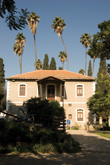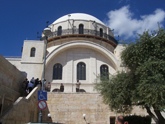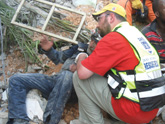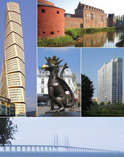×


We have detected your country as:
Please click here to go to the USA website or select another country from the dropdown list.

{image_1}
“The flood of hate is being led by Israel's enemies all over the world…Dark forces from the Middle Ages are raging against us…Be prepared for difficult days.”—Israeli Prime Minister Benjamin Netanyahu
Continue Reading »
I’m a young adult volunteer for Bridges for Peace. When asked if I would like to represent Bridges for Peace in a cycling event in Israel, I jumped at the opportunity. I love to cycle and because it would be a three-day event, it poised a challenge that I could not pass up.
Continue Reading »
{image_1}One year after Tel Aviv celebrated its 100-year anniversary, Israel’s communal kibbutz movement—in many ways the opposite of Tel Aviv’s modern mega-city—is celebrating their 100th birthday. In March, Israel’s first kibbutz, Degania Alef, hosted the kick-off ceremony for the year’s celebrations, as they gear up for the big, national celebration of the kibbutz on October 4. While the kibbutz community’s founding principles of egalitarianism, communal living, and an agriculture-based society are by no means unique to Israel, the kibbutz movement’s role and significance in the creation of Israel’s modern state help set it apart from similar movements around the world.
Continue Reading »
{image_1}After four years of construction, the Hurva Synagogue, in the center of the Jewish Quarter of the Old City of Jerusalem, was rededicated on March 15 and 16. Since 1977, the ruins of its destruction by the Arabs in 1948 have been marked by a single memorial arch. Now it stands again, reconstructed in its original design, both outside and inside. As previously, its 82 foot (25 meter) high dome is once again a distinctive part of the Old City’s skyline. The date of the dedication was carefully chosen—the first day of the biblical month of Nisan, the day the tabernacle was erected in the wilderness (Exod. 40).
Continue Reading »
{image_1}
After three years of unsuccessfully treating his five-year-old son's chronic ear infections with conventional medicine, Jonathan Kestenbaum, an immigrant to Israel from New York, started to explore alternative therapies. “We were at a point where it was either tube surgery or antibiotics for an undetermined amount of time,” explains Kestenbaum, 32. He researched several alternatives before he stumbled upon salt therapy, a natural remedy for respiratory and sinus problems dating back to salt caves in Greece in the Middle Ages
Continue Reading »
{image_1}God said that the Jewish people would be a blessing to the world: “I will bless those who bless you, and I will curse him who curses you; and in you all the families of the earth shall be blessed” (Gen. 12:3). We have seen this happening for decades as Israel is quick to respond to emergency situations around the world. They take the mandate in Deuteronomy 15:7 seriously: “If there is among you a poor man of your brethren, within any of the gates in your land which the LORD your God is giving you, you shall not harden your heart nor shut your hand from your poor brother.” For them, this includes opening their hands to the poor of other countries as well.
Continue Reading »
{image_1} Avner Netanyahu—son of Prime Minister Benjamin Netanyahu and his wife, Sara—won the regional-level, annual Bible quiz in Jerusalem in February. Held at the Bible Lands Museum, family, classmates, and even Avner’s school principal and homeroom teacher cheered him on as he bested 49 competitors and won with a score of 98 out of 100 points.
Continue Reading »
{image_1}“Living conditions in the city have become intolerable for Jews.” This would cause concern anywhere, and you might expect it in a mostly Muslim country, but, amazingly, this came from Sweden. Marcus Eilenberg, a former resident of the city of Malmo and interviewed by Ynetnews, tells more: “Each year the situation gets worse. Sometimes children need to be accompanied by guards when they go to kindergarten, and there are always guards around the Jewish Center…Stones being thrown at the center and other Jewish institutions has become a routine occurrence. Graffiti is scrawled on the walls, including swastikas next to Stars of David and ‘Hitler.’ My children can’t go to any Jewish activities without security.”
Continue Reading »
{image_1} It was an emotional moment. Excited by a move to work as a journalist in Israel, my wife and I were taking the little one to the Middle East for the first time. Bringing our “baby” to the Holy Land was hardly painless. Over many months, we had to get her a passport, vaccinations, a kennel, and an abundance of paperwork. But watching as she wolfed down the kosher kebab they gave her on the flight to Tel Aviv, happy as a clam, we figured everything would be okay.
Continue Reading »
By Chris Eden, BFP South Africa National Director
{image_1}He will set up a banner for the nations, and will assemble the outcasts of Israel, and gather together the dispersed of Judah from the four corners of the earth (Isa. 11:12, NKJV).
Continue Reading »All logos and trademarks in this site are property of their respective owner. All other materials are property of Bridges for Peace. Copyright © 2025.
Website Site Design by J-Town Internet Services Ltd. - Based in Jerusalem and Serving the World.